Do you ever feel like your to-do list is endless and you’re constantly chasing time to complete your goals? Weekly goals might just be the answer. They bridge the gap between your long-term goals and daily tasks, giving you a clear roadmap to success.
In this article, I will share the 10 weekly goal ideas, their importance for managers, how to set weekly goals as well as methods for fulfilling these goals.
What are weekly goals?
Weekly goals refer to breaking down your goals into smaller chunks that you can achieve within a week. This is the best way to start goal setting.
In general life, your goal could be to own a cool BMW, but that is not a good weekly goal. Weekly goal refers to small targets like hitting the gym for 3 consecutive days, avoiding eating out for 5 days, etc.
Simply put, weekly goals help you progress towards your long-term goals, as you can achieve and fulfil small targets in your journey towards the ultimate goal.
When it comes to the workplace, weekly goals refer to completing a specific task or a project activity within a week. This will help you in making steady progress toward your project completion.
Now that we have understood weekly goals, the next thing that you must be wondering now, is how you would implement this in your managerial workflow and its importance, but before that, let’s discuss the examples of weekly goals for managers.
Why setting weekly goals is important for managers?
Let me put you in an imaginary situation to provide a better perspective of the importance of weekly goal-setting in an office environment.
You are working on publishing weekly content for your website. You set your goal to work for at least 1 hour every day. At the end of the week, you realize that you worked every day on the task, however, you could not publish any article. This is because you had not set a target that you could measure and evaluate.
So, instead of setting the target as 1 hour every day, you needed to define your target of writing at least 500 words each day. This way you would have ensured to achieve your target of publishing content weekly.
The key benefits of weekly goal-setting are as follows –
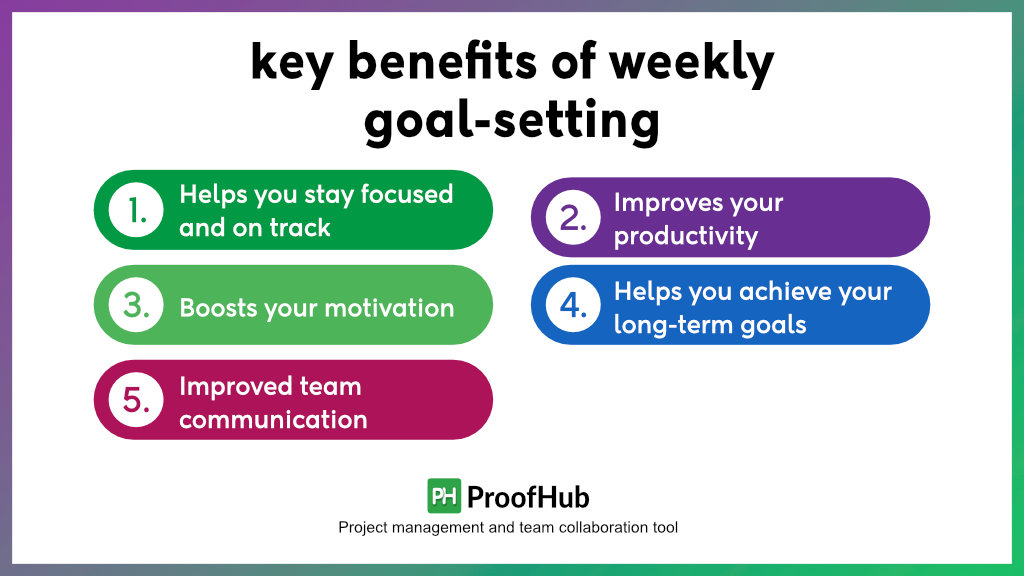
1. Helps you stay focused and on track
As the manager, you would always be faced with numerous challenges that compete for your attention. When you predetermine your goals for the week you can establish a clear priority in your tasks and ensure that you do not get lost. A steady focus will ensure that you are aligned toward achieving your goal and staying on track with the company’s vision.
2. Improves your productivity
When you set weekly goals, you break down large tasks into smaller chunks. This eliminates procrastination and prevents your team members from looking at tasks as daunting. Achieving smaller milestones regularly builds up a sense of accomplishment, thereby, improving the overall productivity of your team in successfully delivering quality projects.
3. Boosts your motivation
The sense of accomplishment that we discussed above serves as a continuous motivation for your team members. When your team is motivated, they are keen to accomplish more goals. This helps you to effectively complete projects on time.
4. Helps you achieve your long-term goals
When it comes to successfully achieving long-term goals, it is all a matter of working on incremental short-term goals. When you are focused on accomplishing short-term goals, you are actively aligned toward achieving your long-term goals as well.
5. Improved team collaboration and communication
As managers, we need to ensure that our teams have a clear and concise understanding of the good weekly goals. Effective communication and collaboration ensure that team members align their goals with the vision of the company. This not only ensures that your goals for the week are fulfilled, but is fruitful for your company in the long run.
What are the common mistakes to avoid when setting weekly goals?
To achieve your weekly goals, here are some common mistakes you should avoid:
1. Setting unrealistic goals: Setting goals that are achievable in a week can lead to frustration and disappointment. Ensure your goals are challenging but realistic and can be achieved within the weekly timeframe.
2. Lack of specificity: Avoid setting vague goals like “be more productive” that don’t provide a clear direction or measurable outcomes. To stay focused, make your goals specific, such as “finish drafting the marketing report by Thursday.
3. Overloading your week: Trying to complete too much at once can lead to decreased efficiency and burnout. Focus on upto 3-5 key tasks and ensure you give them time and work dedicatedly on them.
4. Skipping prioritization: Every goal is important when you do not set priorities. When you do not prioritize your goals, it dilutes your focus and wastes your energy. Prioritize high-impact goals that align with your bigger objectives to make the most of your efforts.
5. Ignoring flexibility: Following plans rigidly when unanticipated changes arise can lead to unnecessary stress and missed opportunities. You should adapt your goals according to the new priorities or challenges without losing sight of the bigger picture.
How to set and achieve effective weekly goals?
Having seen the importance of weekly goals, let us now analyze how we can set and achieve good weekly goals in practical day-to-day applications.
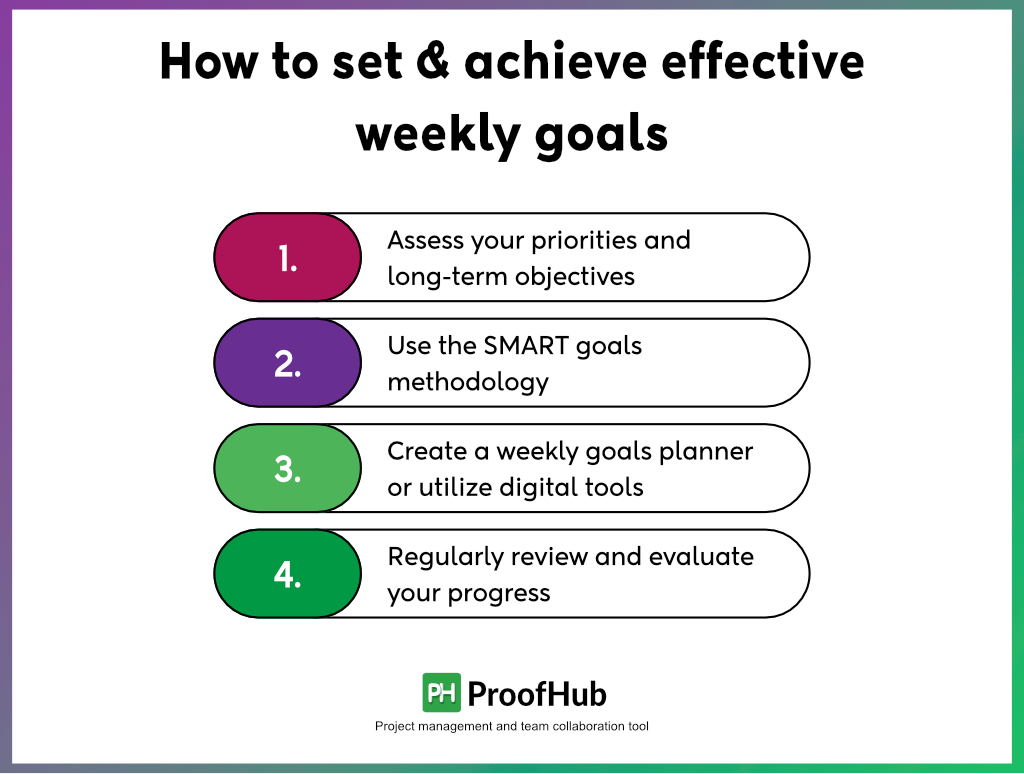
1. Assess your priorities and long-term objectives
Categorizing various tasks will help you to understand your priorities with ease. Prioritizing tasks will help you create a work order that will help you make steady progress toward the overall target of the company.
Breaking down tasks into small manageable chunks is the most simple way to manage long-term objectives. When you provide your team members with specific and measurable goals they not only accomplish them on time but also deliver high-quality results.
For instance, if you are looking to publish 100 articles for your website over a period of 1 year, break it down to ensure that 2 articles are continuously posted every week. This will ensure that you achieve your long-term objective of 100 articles.
2. Use the SMART goals methodology
SMART goals refer to the goals that are SMART😉, i.e.,
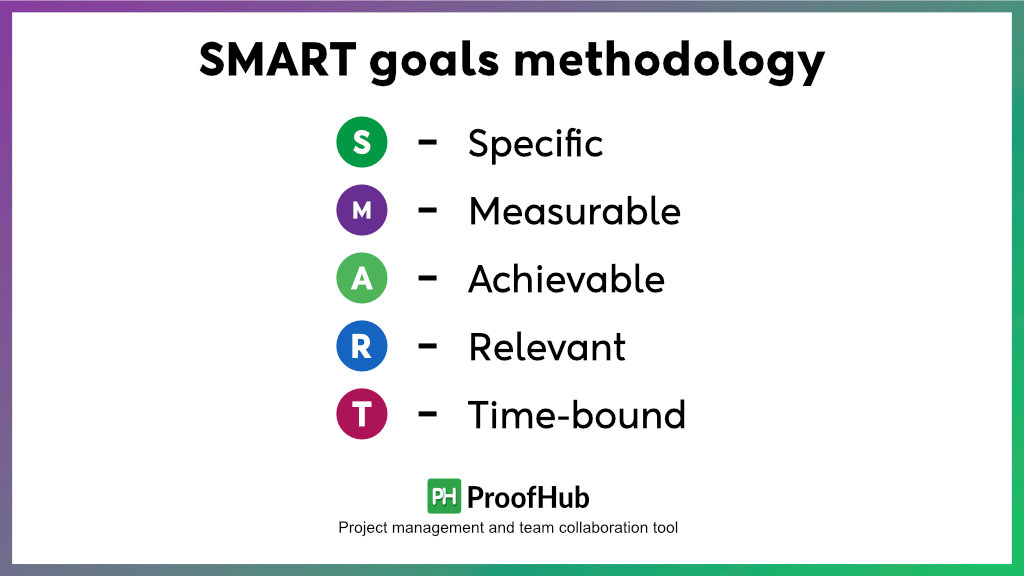
S – Specific
Specific weekly goals refer to goals that are clearly defined, thereby, ensuring that your team members have a clear and concise understanding of what they are working on.
M – Measurable
Set goals that are tangible, this helps you measure the work completed at the end of the week. This will help you to analyze the work completed by your team members throughout that week.
A – Achievable
Setting realistic targets is essential for achieving good goals for the week. When you set far bigger targets, your team members feel like underachievers if they are not able to fulfill those weekly goals.
R – Relevant
The weekly goals that you set should be in line with the overall vision of the company. The weekly goals should relate to the longer goals, which should eventually contribute to the overall.
T – Time-bound
Although good weekly goals are time-bound, you can further set up goals that have defined time limits. This will further help your team members work proactively toward fulfilling their goals for the week.
With the SMART goals methodology, you can not only set realistic goals for the week but also ensure that your team members are able to achieve those by ensuring that these goals are specific, achievable, and relevant.
Read more – Smart project management goals that actually works
3. Create a weekly goals planner or utilize digital tools
If you believe in creating a weekly plan and do not write it down, then you are not doing it right.
This is because you are using your right brain to make a creative and imaginary roadmap, but when you actually write it down or use a planner you effectively induce your left brain and the subconscious brain into action. This will help you to convert your imaginary roadmap into an actual process.
Further, technological advancements make this process additionally simpler with planning tools like ProofHub, which not only assist you in creating a plan but also effectively follow the plan and deliver quality results.
Key features provided by ProofHub to effectively create and accomplish weekly goals
- The intuitive task management dashboard assists you in creating an effective plan, delegating tasks, monitoring progress, and even identifying potential bottlenecks early.
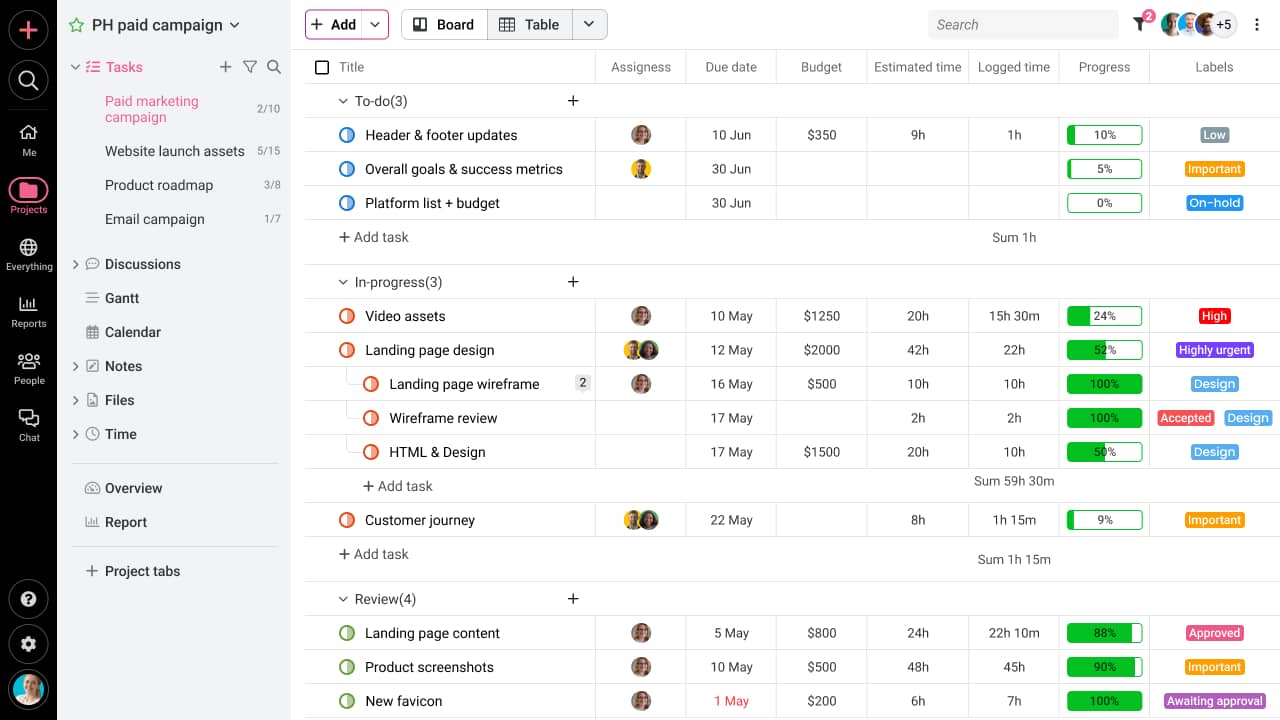
- When you break down tasks into smaller chunks, Gantt charts let you set dependencies between the subtasks you create and milestones so that your team members are aware of their individual tasks.
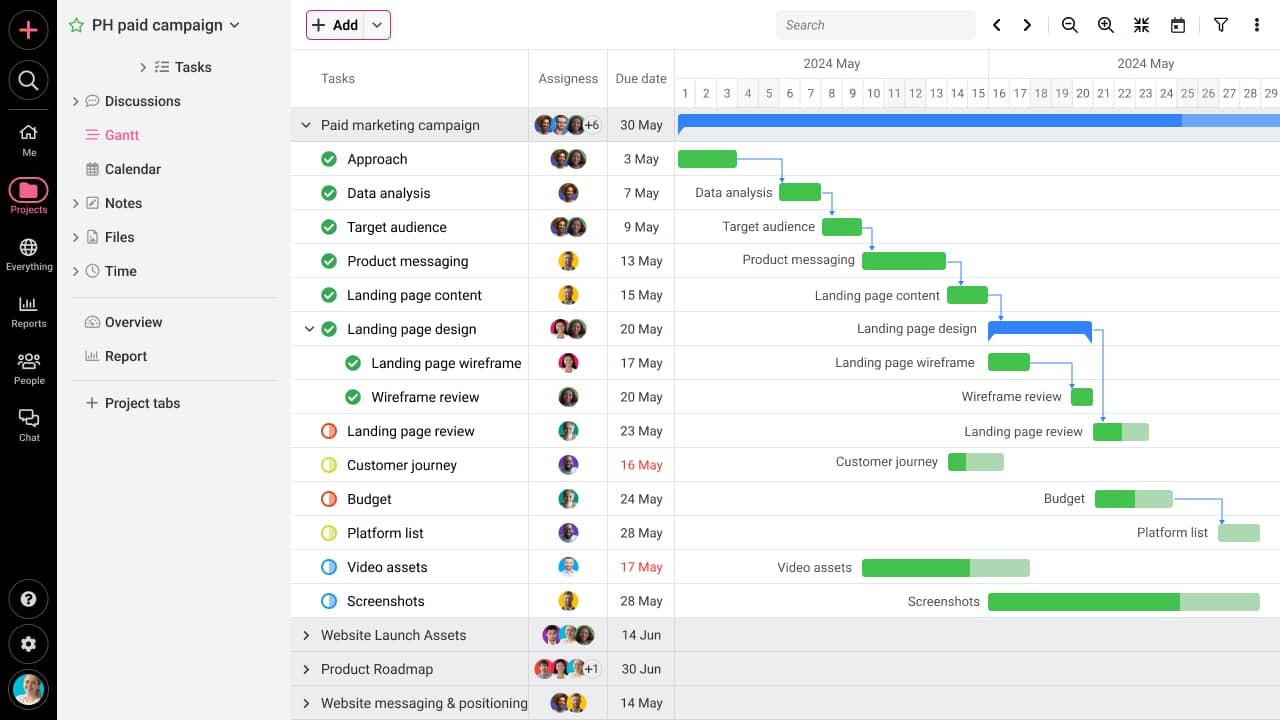
- At the start of every week, you can use Discussion while creating and assigning weekly tasks and task lists.
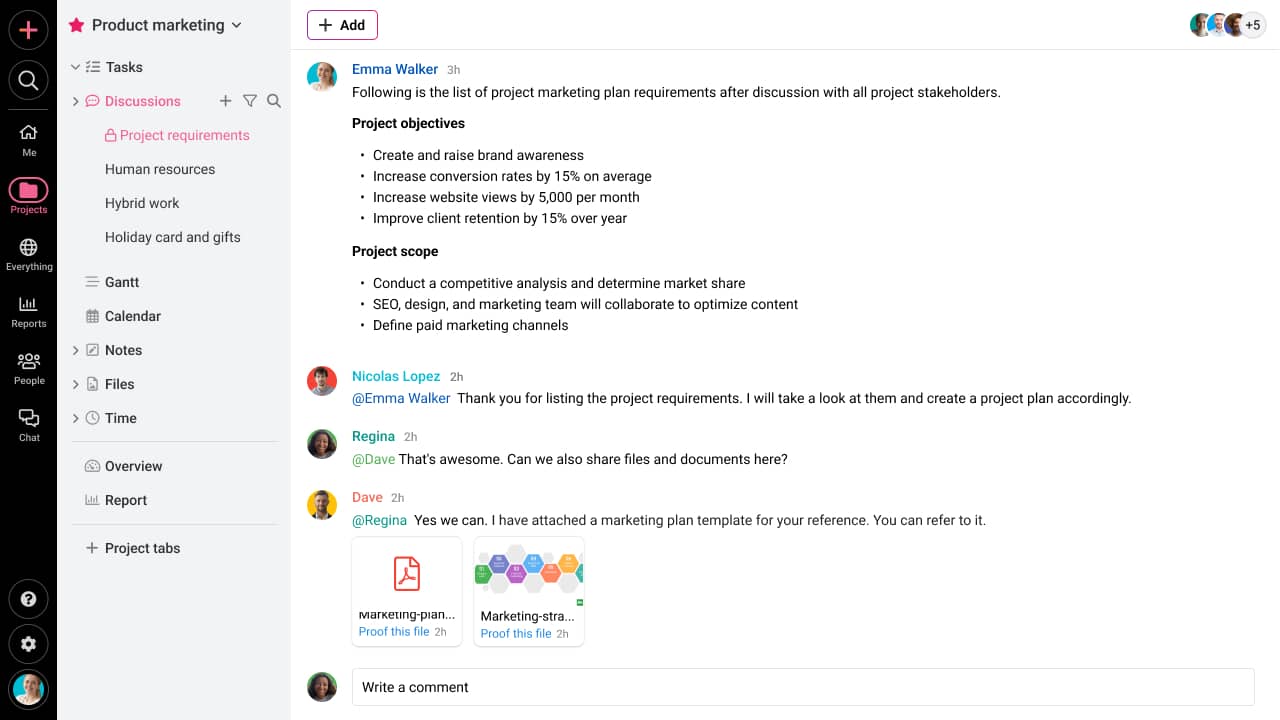
- Powerful collaboration and communication features such as Notes, Chat, and Comments (@mention) help in aligning your entire team toward the vision of your company.

- Built-in time tracker that helps you to set time limits for various tasks. You can use timesheets to track time spent by your team members on various tasks and identify the real reason for delays.
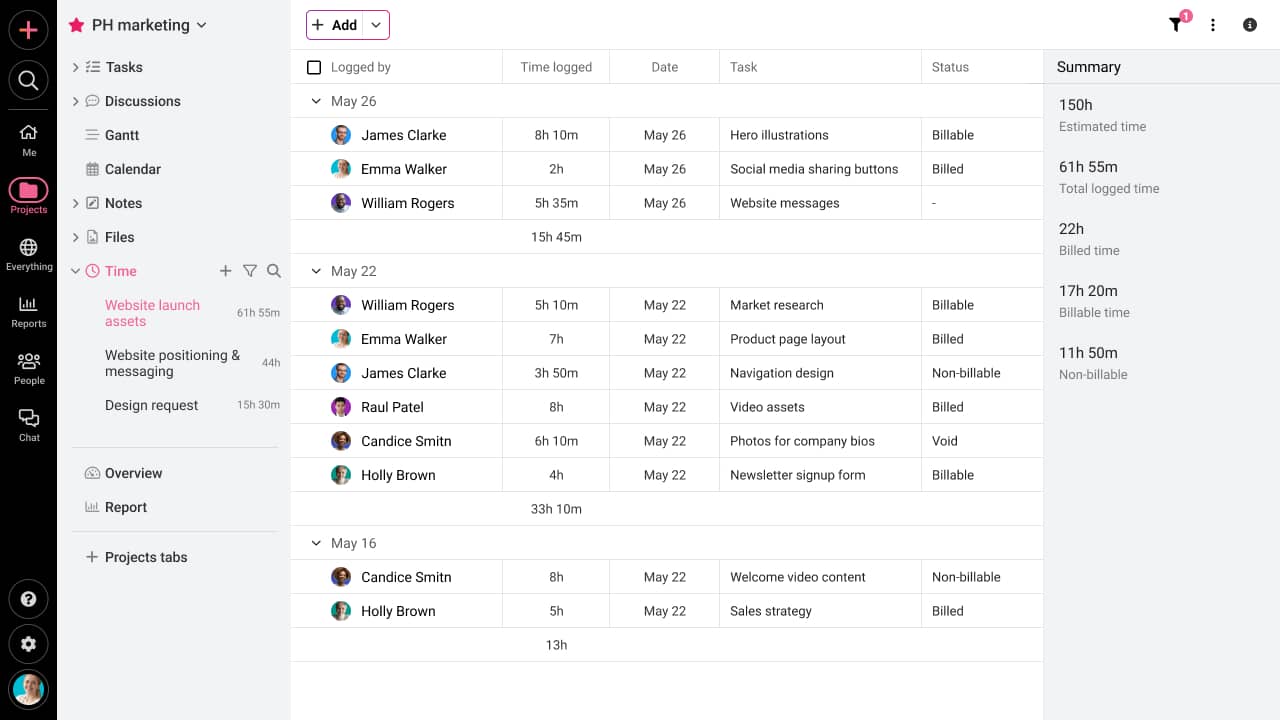
4. Regularly review and evaluate your progress
A key criterion in ensuring steady progress and delivering quality projects is continuous evaluation and review of the various tasks. Review meetings should be held at least once in the latter half of the week to ensure quality work as well as timely completion of goals.
A regular review involves scheduling sessions where you appreciate accomplishments and understand issues that caused complications in the smooth flow of project work. This will help you to identify specific spots where you need to improve and create roadmaps accordingly while planning future weekly goals.
Further, these reviews and evaluations will help you to build an adaptable team that is able to make quick decisions and accomplish weekly goals with ease. Finally, you can use these meetings to plan and schedule tasks for the upcoming week.
10 Examples of weekly for managers
Now in this section, I have basically listed 10 weekly goals ideas that you could set for yourself. This list is a combination of both personal and professional weekly goals.
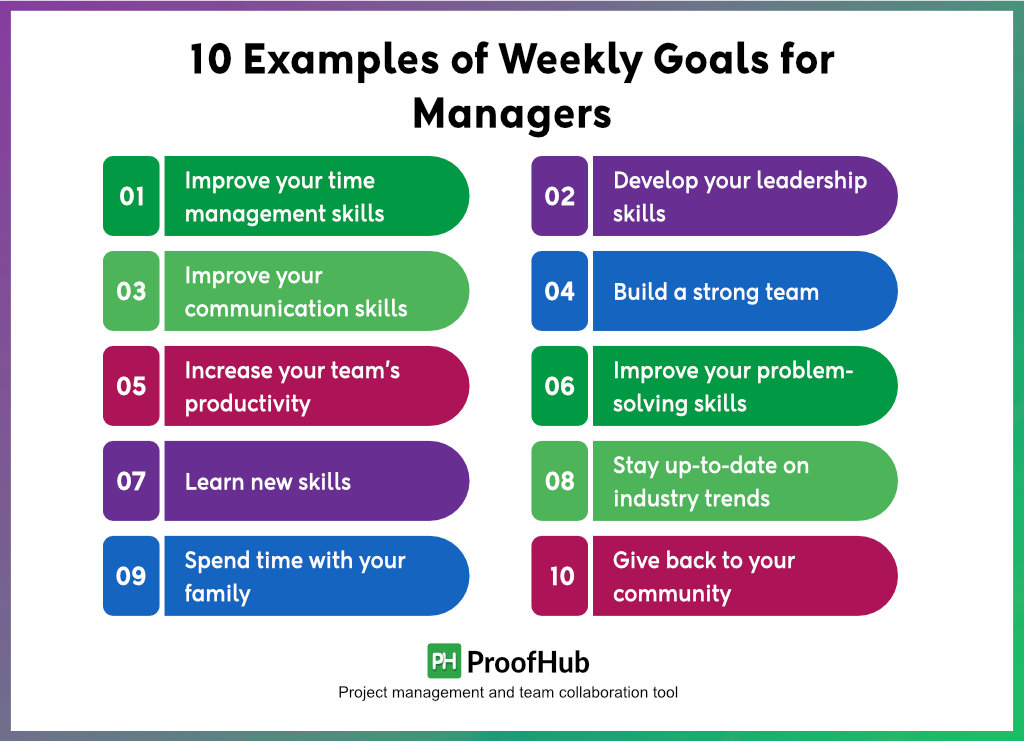
1. Improve your time management skills
Start by creating a weekly schedule. This will help you define your workflow and concentrate on completing it on time. Although you need to make a schedule with flexibility, it is equally important to say NO to new commitments.
Adding new tasks to your schedule will lower the importance and impact of your weekly schedule. In such cases, you should delegate tasks to your team members, thereby, establishing effective time management and also timely completion of project work.
2. Develop your leadership skills
Harnessing skills is a never-ending task. Spend your time constructively by reading books and articles on leadership. Allot a certain time throughout the week to improve on your leadership skill set in a week.
This will play a significant role in improving the overall performance of your team. Attending workshops and conferences will not only help you to develop your leadership skills but provide you with a platform for interacting with peers that will help you to gain different perspectives for all-round development.
3. Improve your communication skills
Clear and concise communication is the base for establishing a steady communication system with your team members. Fix a certain time every week when you provide your team members with constructive feedback. This will not only ensure that your team members are on the same page as you but also stay on track for completing the project on time.
Listening plays a key role in any leadership position. You need to listen to your team members to create an inclusive plan that will help align the entire team to the vision of the company.
Enhance internal communication in your team with these 13 best internal communication tools
4. Build a strong team
By breaking down project tasks into small chunks, you are effectively building a positive and supportive team culture. With weekly goals, your team members can comprehensively reach the desired milestones.
Week goals help analyze the project’s progress and provide timely feedback that ensures steady progress of work and ease of accomplishing weekly tasks.
5. Increase your team’s productivity
Weekly goals help you to define clear expectations regarding project work. This ensures that your team members are able to work clearly on their defined roadmap.
Further, ensure that you allot sufficient time for various tasks, and provide your team members with the necessary resources for successfully completing their work. When you set realistic weekly goals, and motivate your team members, the overall productivity of your team is enhanced.
Accomplish weekly goals with the 43 productivity tools to enhance the focus of your team
6. Improve your problem-solving skills
When working with weekly time-bound goals, you need to be proactive when it comes to identifying roadblocks and problems. Small delays can cause a major impact, thereby, resulting in incomplete goals and productivity loss.
It is essential for you to ask for help when you feel that you are not able to solve a certain problem. Week goals may look small, but the time period is short. Therefore, do not waste time searching for ideas, instead ask for help from an expert.
7. Learn new skills
Growth is a never-ending process, and so is learning new skills. Skills play a key role not only in your professional development but also in your personal life.
Fix a certain time every week for learning new skills. Set your goal to learn at least one new skill every week. Sign up for online courses, and workshops read books, and articles. Interacting and networking with peers and industry leaders are some of the best ways to learn new skills in your busy schedule.
8. Stay up-to-date on industry trends
Technology advancements happen every day. You will have to spend a fixed time every day reading industry publications. Further, staying up-to-date will help you to understand trends within the industry.
Attending industry conferences and following industry thought leaders on social media are the basic ways to get started. Every small piece of news about new developments will eventually provide you with fruitful returns in the long run.
9. Spend time with your family
Building strong family relationships and personal life bonding is necessary to maintain a steady work-life balance. You need to set apart a fixed time for your family and friends.
When you schedule time with your family ensure that you completely spend time off the grid. This not only provides you with adequate relaxation but also serves as a stress buster.
10. Give back to your community
As far as it is important for you to concentrate on your tasks and personal life, it is essentially important for you to spend some time every week for the community as well.
This could be as simple as mentoring a young person, donating to a charity, or volunteering time at a local organization. This will not only help you in recreation but also help you to spend your time constructively, as you are nurturing the next generation who will walk in your footsteps.
You will start seeing the results when you align your efforts to your goals which in return will help boost your overall productivity.
Conclusion
Weekly goal setting is a powerful exercise that will help you to enforce complete control over your projects and team members. You are not only able to complete tasks on time but also work with enhanced efficiency and guide your entire team toward success.
By following the tips in this article, and implementing goal-tracking software in your day-to-day activities, you can effectively build a road map that will lead you on the path to success. A planner or a digital tool like ProofHub not only assists you in creating weekly plans but also ensures that you work accordingly.
Related articles
- 13 proven strategies on how to stay focused at work
- How to prioritize tasks and maximize productivity at work
- 22 Effective time management strategies for work
- How to increase your workplace productivity
- 43 productivity tools that will make your life much easier
FAQs
How do I determine the right goals for each week?
To set the right weekly goals, prioritize tasks aligned with your long-term goals and the company’s vision. Break larger goals into smaller, achievable chunks. Take into consideration your current commitments, energy levels, and deadlines. Maintain flexibility to adapt to changing circumstances. Regularly review and adjust your goals for optimal progress and productivity.
What tools can help me track my progress?
Different tools can assist you in tracking your progress, such as ProofHub for task management and assistance in team collaboration, Google Analytics for website metrics, Excel/Google Sheets for data analysis, and fitness apps like Strava. For personal goals, journals are the best choice.
How to adapt to unexpected changes that disrupt my goals?
To adapt to unexpected disruptions, continuously reevaluate your goals as your circumstances change. Flexible and open-mindedness are necessary for adjusting your strategies when the need arises. Focus on only those things that you can control, maintain a positive mindset, and consider changes as opportunities for personal growth, development, and learning.
Can I have personal and professional weekly goals simultaneously?
Setting both personal and professional weekly goals is a great way to achieve a balanced and fulfilling life. Combining these goals can help you prioritize tasks effectively and enhance productivity and well-being. Just ensure they are realistic and manageable within your weekly schedule.
What is the ideal number of goals to set in a week?
The ideal number of goals to set per week depends on your competence and ability to work on different tasks. This is a subjective number and can vary from person to person. A balanced approach will involve 3-4 achievable goals. Prioritize tasks, work with steady progress and time commitment, maintain focus to enhance productivity, and avoid procrastination.

